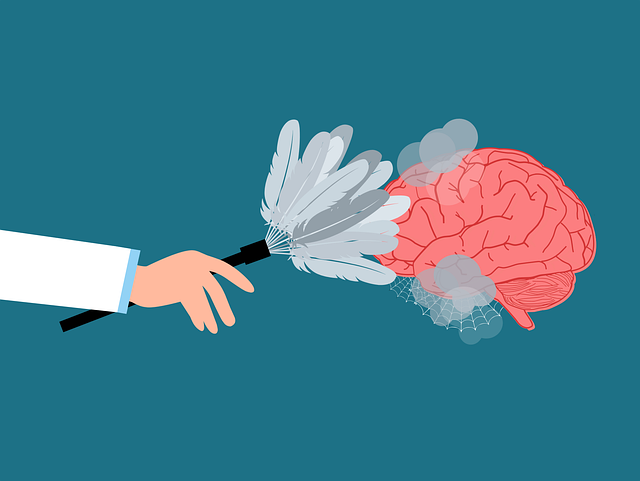Mental health professionals in Lafayette encounter unique challenges like burnout and stress due to demanding workloads and complex patient cases. To mitigate these risks, effective communication strategies such as producing mental wellness podcasts are crucial. By sharing experiences and promoting self-care practices, therapists enhance resilience and improve patient care. This approach addresses Lafayette's demand for therapy services while preventing workplace issues related to job stress among mental health workers. Key strategies include mood management, self-care routines, and self-awareness exercises, ensuring professionals can handle challenges without compromising their well-being. Comprehensive risk assessment and tailored stress reduction methods are vital for fostering a resilient practice environment in the face of Lafayette Workplace Issues and Job Stress Therapy.
In the demanding field of mental health, professionals constantly navigate complex emotional landscapes. Beyond clinical challenges, Lafayette Workplace Issues and job stress therapy are crucial considerations. This article delves into the unique risks faced by these practitioners, from burnout to secondary trauma. We explore identifying potential workplace hazards, implementing robust risk assessment strategies, and fostering resilient practice environments. By understanding these aspects, mental health professionals can better manage job stress therapy and enhance their well-being.
- Understanding Mental Health Professional's Unique Risks
- Identifying Potential Lafayette Workplace Issues
- Implementing Comprehensive Risk Assessment Strategies
- Managing Stress and Fostering Resilient Practice Environments
Understanding Mental Health Professional's Unique Risks

Mental health professionals face unique risks that often go unnoticed but significantly impact their well-being. Beyond the challenges of handling sensitive patient cases, these professionals are constantly navigating complex human emotions and behaviors. This high-pressure environment can lead to a range of workplace issues, including burnout, stress, and even depression. In a city like Lafayette, where therapy services are in demand, mental health workers must manage intense workloads while maintaining ethical boundaries, which can be especially demanding.
Effective communication strategies are crucial for mitigating these risks. Mental wellness podcast series production, for instance, offers an innovative outlet to discuss professional challenges and promote self-care practices. By sharing experiences and knowledge, therapists can foster a sense of community and learn valuable burnout prevention techniques. This not only enhances their resilience but also improves patient care by ensuring professionals remain engaged and emotionally balanced in their work.
Identifying Potential Lafayette Workplace Issues

Mental health professionals, while dedicated to helping others, are not immune to workplace issues that can impact their own well-being. In a setting like Lafayette, where high-stress environments and demanding caseloads are common, identifying potential workplace hazards is crucial for maintaining professional resilience. These Lafayette Workplace Issues can range from heavy workloads and long hours to complex client interactions and emotional drainage.
Effective risk assessment involves recognizing these challenges, such as job stress related to therapy sessions. Professionals should prioritize mood management techniques and integrate self-care routine development for better mental health. Additionally, practicing self-awareness exercises can help professionals recognize their own limits, prevent burnout, and ensure they provide the best care possible.
Implementing Comprehensive Risk Assessment Strategies

Implementing Comprehensive Risk Assessment Strategies is a critical component of mental health professional’s practice, especially in navigating the complex landscape of Lafayette Workplace Issues and Job Stress Therapy. It involves a multifaceted approach to identify and mitigate potential risks that can impact both professionals’ well-being and their ability to provide effective care. By integrating Mental Health Awareness into daily practices, therapists and counselors can foster an environment where Self-Care Routine Development for Better Mental Health becomes a priority.
Regular risk assessments should include screening for stress levels, burnout, and any underlying mental health conditions. This proactive measure enables the implementation of Stress Reduction Methods tailored to individual needs. Through structured conversations and evidence-based tools, professionals can identify early warning signs and develop coping strategies to enhance resilience, ensuring they are better equipped to handle workplace challenges without compromising their mental health.
Managing Stress and Fostering Resilient Practice Environments

Mental health professionals often bear witness to intense emotional experiences and challenging situations, which can lead to significant stress and potential burnout. Effective management of workplace stress is essential for maintaining a healthy work-life balance and ensuring the well-being of both practitioners and their clients. Incorporating strategies for anxiety relief and stress management workshops within organizations can be transformative. These initiatives encourage professionals to prioritize self-care, fostering an environment where resilience can flourish. By learning conflict resolution techniques, therapists can navigate complex interpersonal dynamics in a constructive manner, further enhancing their ability to manage stress and provide quality care.
Creating resilient practice environments involves organizational culture shifts that promote open communication, support systems, and healthy boundaries. Encouraging professionals to share experiences and implementing regular debriefing sessions can help process emotionally taxing cases. Additionally, organizations should prioritize resources for mental health support, including access to therapy services specifically tailored to address Lafayette workplace issues and job stress. Such proactive measures contribute to a thriving professional community, enabling therapists to thrive in their roles while effectively supporting their clients’ journeys towards mental wellness.
Mental health professionals face unique challenges that can lead to significant risks if not addressed properly. By understanding the specific dangers within the Lafayette workplace environment, such as intense caseloads and emotional strain, practitioners can proactively identify potential issues through comprehensive risk assessments. Implementing effective strategies involves regular self-care practices, stress management techniques, and creating resilient work environments. Embracing these measures ensures therapists can provide quality care while mitigating job stress therapy risks, fostering a healthier and more sustainable career.














